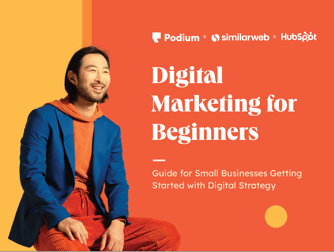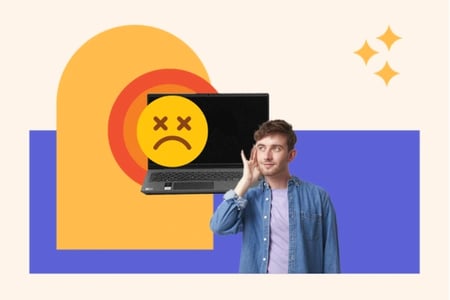-

Ecommerce Customer Journey Mapping — How to Set Potential Shoppers Up to Buy [Ti...
All online businesses benefit from creating an ecommerce customer journey map. Learn how t...
Rebecca Riserbato
4/11/25
-

What Is a Competitive Analysis — and How Do You Conduct One?
Learn to conduct a thorough competitive analysis with my step-by-step guide, free template...
Christine White
4/11/25
-

Lead Scoring Explained: How to Identify and Prioritize High-Quality Prospects
Learn how to use lead scoring to figure out where your leads stand and who’s most likely t...
Lindsay Kolowich Cox
4/11/25
-

The HubSpot Blog's 2025 Social Media Marketing Report: Data from 1100+ Global Ma...
We surveyed 1100+ global social media marketers across B2B and B2C industries in the Unite...
Ramona Sukhraj
4/10/25
From HubSpot's video library
-
.jpg?height=240&name=YT-237_A%20(1).jpg)
How to Start Affiliate Marketing With No Experience or Money (4 Free Tools!)
-

How Airlines Really Make Money | Hustlenomics | The Hustle
-
.jpg?height=240&name=IMG_0735%20(1).jpg)
What Entrepreneurs Can Learn From Native Deodorant
-

Meet the Designer Behind the Iconic Nudie Suit | Unknown Empires
-

Tips For Elevating Your Next Go-To-Market Strategy (+ Free Templates)
-

Why T-Mobile Trademarked This Color | The Hustle
-
.jpg?height=240&name=YT-237_A%20(1).jpg)
How to Start Affiliate Marketing With No Experience or Money (4 Free Tools!)
-

How Airlines Really Make Money | Hustlenomics | The Hustle
-
.jpg?height=240&name=IMG_0735%20(1).jpg)
What Entrepreneurs Can Learn From Native Deodorant
-

Meet the Designer Behind the Iconic Nudie Suit | Unknown Empires
-

Tips For Elevating Your Next Go-To-Market Strategy (+ Free Templates)
-

Why T-Mobile Trademarked This Color | The Hustle
-
.jpg?height=240&name=YT-237_A%20(1).jpg)
How to Start Affiliate Marketing With No Experience or Money (4 Free Tools!)
-

How Airlines Really Make Money | Hustlenomics | The Hustle
-
.jpg?height=240&name=IMG_0735%20(1).jpg)
What Entrepreneurs Can Learn From Native Deodorant
-

Meet the Designer Behind the Iconic Nudie Suit | Unknown Empires
-

Tips For Elevating Your Next Go-To-Market Strategy (+ Free Templates)
-

Why T-Mobile Trademarked This Color | The Hustle
-

22 Customer Touchpoints That Will Optimize Your Customer Journey
Learn everything you need to know about customer touch points, including what they are and...
Clint Fontanella
4/11/25
-

How I Write Effective Knowledge Base Articles [+Templates]
This guide will walk you through everything you need to know to leverage knowledge bases f...
Diego Alamir
4/10/25
-

Customer Feedback Management — Turning Desperate Comments Into Strategy
Feedback helps you understand customer sentiment, product issues, and pain points in UX. S...
Sarah Chambers
4/9/25
-

Making the B2B Customer Funnel Work for Your Team — Proven Strategies
Learn how to make a good customer funnel that will help your customers at every stage, fro...
Taylor Cromwell
4/8/25

An Introduction to Digital Marketing
Learn the basics of digital marketing and explore different ways to reach your ideal customer.
-

50+ Small Business Ideas for Anyone Who Wants to Run Their Own Business
Need small business inspiration? Our guide offers 70 ideas to kickstart your entrepreneurs...
Shadrack Wanjohi
4/9/25
-

Managing Partner: Who They Are and What They Do
What does it take to be a managing partner? This guide breaks down the key responsibilitie...
Jenny Bergen Clark
4/9/25
-

Shortcuts Salespeople Should Never Take, According to Experts
Not all shortcuts are created equal. Learn which sales mistakes to avoid to improve conver...
Aja Frost
4/9/25
-

The Buyer Motives Every Salesperson Should Know (+Tips from the Field)
There’s a reason for every purchase. Learn about 8 buyer motives and how to navigate emoti...
Dagny Dukach
4/8/25
From the HubSpot Podcast Network
-
Business Made Simple

Your Website Probably Stinks—Here’s How to Fix It!
-
The Science of Scaling

How to Scale a Billion Dollar Sales Team w/ John McMahon (Board Member, Snowflake)
-
Truth, Lies and Workplace Culture
-2.png?height=240&name=PodcastCovers23%20(1)-2.png)
From Bystander to Ally: How to Avoid DEIB Washing
-
Imperfect Action
-2.png?height=240&name=PodcastCovers23%20(4)-2.png)
The art of the post-launch review: 5 questions to make your next launch a success
-
Latinx In Power
.png?height=240&name=PodcastCovers23%20(6).png)
Harnessing the Power of Silence in Negotiation with Diana Kleps
-
The Sales Evangelist

5 Ways To Do Daily Outbound With LinkedIn
-
Business Made Simple

Your Website Probably Stinks—Here’s How to Fix It!
-
The Science of Scaling

How to Scale a Billion Dollar Sales Team w/ John McMahon (Board Member, Snowflake)
-
Truth, Lies and Workplace Culture
-2.png?height=240&name=PodcastCovers23%20(1)-2.png)
From Bystander to Ally: How to Avoid DEIB Washing
-
Imperfect Action
-2.png?height=240&name=PodcastCovers23%20(4)-2.png)
The art of the post-launch review: 5 questions to make your next launch a success
-
Latinx In Power
.png?height=240&name=PodcastCovers23%20(6).png)
Harnessing the Power of Silence in Negotiation with Diana Kleps
-
The Sales Evangelist

5 Ways To Do Daily Outbound With LinkedIn
-
Business Made Simple

Your Website Probably Stinks—Here’s How to Fix It!
-
The Science of Scaling

How to Scale a Billion Dollar Sales Team w/ John McMahon (Board Member, Snowflake)
-
Truth, Lies and Workplace Culture
-2.png?height=240&name=PodcastCovers23%20(1)-2.png)
From Bystander to Ally: How to Avoid DEIB Washing
-
Imperfect Action
-2.png?height=240&name=PodcastCovers23%20(4)-2.png)
The art of the post-launch review: 5 questions to make your next launch a success
-
Latinx In Power
.png?height=240&name=PodcastCovers23%20(6).png)
Harnessing the Power of Silence in Negotiation with Diana Kleps
-
The Sales Evangelist

5 Ways To Do Daily Outbound With LinkedIn
-

How to Change HTML Text Font & Font Color
Learn how to change your font using HTML and CSS, including font type, size, and color.
Anna Fitzgerald
4/9/25
-

HTML Projects for Beginners: 10 Easy Starter Ideas
Discover 10 easy HTML projects for beginners to enhance your web development skills. Perfe...
Danielle Ellis
4/8/25
-

20 UX Design Examples Hand-Picked by Experts [With Analysis]
Discover top UX design examples selected by UX researchers and designers, and get expert i...
Amy Rigby
4/7/25
-

How to Conduct a UX Audit: Steps, Tips, & Best Practices
Learn how to conduct a UX audit for your website or app to improve user experience, plus g...
Kiran Shahid
4/7/25
-

How Nielsen’s Usability Heuristics Apply to Websites, According to UX Pros
Learn how to apply the 10 usability heuristics to your website and create user-centered in...
Clint Fontanella
4/7/25
-

Building a Scalable Website — All the Components You Need
Learn how to build a scalable website that can handle high traffic demands efficiently and...
Darrielle Evans
4/3/25
Explore more topics
Ready to brush up on something new? We've got more to read right this way.






.png)
